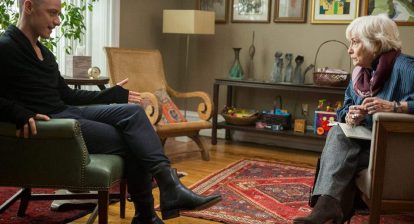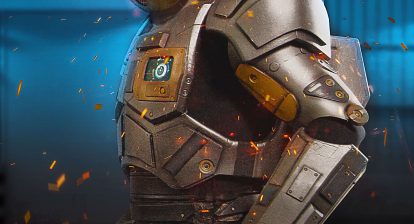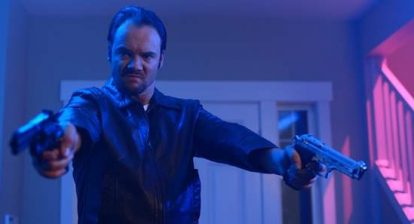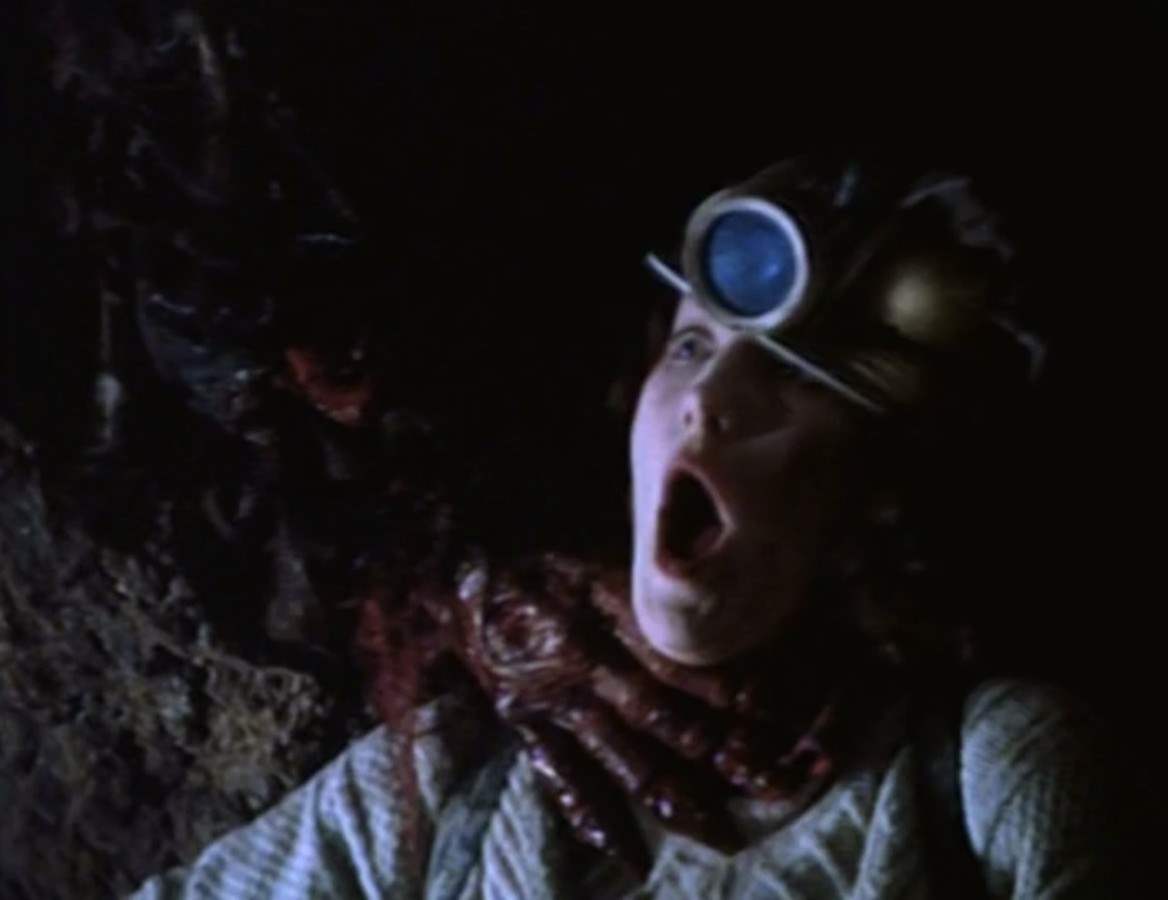Spring is one of the most intriguing titles to boast the genre of “supernatural romance” in quite a while. Set on the beautiful Italian coast, the film follows Evan (Lou Taylor Pucci), an American traveling Europe in a need to get away, and Louise (Nadia Hilker), a gorgeous and intelligent foreign girl that is certainly more than she seems. The picture is co-directed by Justin Benson and Aaron Moorhead, the team behind Resolution and the VHS: Viral segment Bonestorm. Spring isn’t a movie that could have come from anyone else. We recently got the chance to sit down with the duo to discuss the project. So, have a look at the interview below and check out the film on DVD and blu ray now.
Related: The Endless Will Entertain and Challenge You for Endless Viewings [Review]
Wicked Horror: So Spring is a supernatural romance with a pretty unique creature. Which idea came first? The romance angle or the idea for the creature?
Justin Benson: Well basically Aaron’s and my first movie was also kind of a monster movie, but there was a story reason why we never show it. So going into the next movie there was the idea of being like a monster movie, but we wanted to do something unique. It kind of feels like the same six myths are recycled over and over and over again, so there was an ambition to create a new monster, a new kind of myth. That was the thing that came first, but due to how it worked and how Louise’s body worked, the romance quickly followed because she needed like an act of love. So the monster came first, but about two seconds later the romance came.
WH: You called it an “evolutionary Frankenstein.” Since it’s sort of a mash up of a bunch of different monsters, where there any specifics you were trying to work in or references?
Justin Benson: No, it was more about using glimpses of her transformation to give red herrings of her being a particular monster that people already have a… When people see claws and hair and feet they think werewolf and when people see blood and teeth they’re gonna think vampire. So if we just showed portions of her transformation without showing the whole thing, then there was an intentional red herring to mislead the audience to what kind of monster she was.
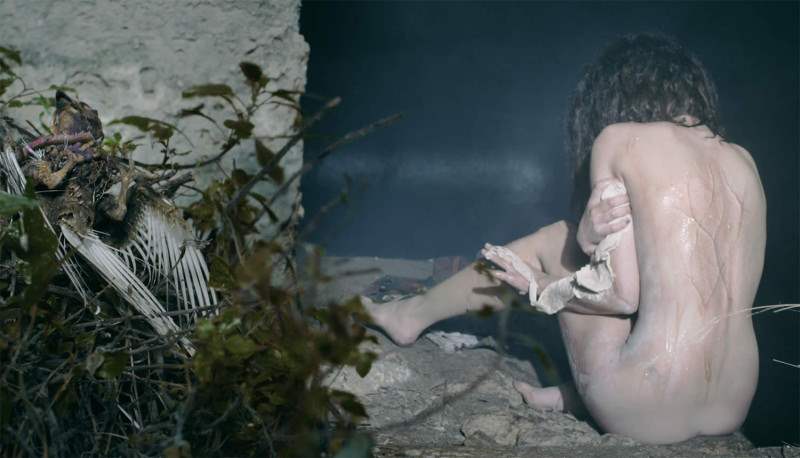 WH: Since it’s a supernatural romance, were there any misconceptions about that when you were pitching it? When people hear a term like that, the first thought is something like Twilight or Warm Bodies, but you’re obviously going in a very different direction.
WH: Since it’s a supernatural romance, were there any misconceptions about that when you were pitching it? When people hear a term like that, the first thought is something like Twilight or Warm Bodies, but you’re obviously going in a very different direction.
Aaron Moorhead: Yeah, it wasn’t a misconception in that people thought it was gonna be like Twilight. In fact we kinda wish we did use that as a bit more of a test because people would’ve been like, “Oh, Twilight made a lot of money, let’s do it!” No, it was mostly that people had trouble grasping that it was both and the feedback would be something like, “It’s not horror enough,” or, “It’s not love story enough.” We were just saying, “We don’t really care, we just wanna make this movie that is both or neither or a mix of both, it doesn’t really matter. You know, I just think that one of the things that matters the absolute least about the quality of the movie is how you describe it in a quick and concise way. It matters in a marketing standpoint, but that just means your target’s smaller to hit, but you can still hit it. You can still find a way to really intrigue people as long as your movie is something pretty compelling. That was our big fight on the business side is it was troublesome to find people that basically were okay with the third act not being her transforming into a giant monster and chasing him around.
WH: This is a very performance-driven movie. How tough was the casting process?
Justin Benson: The casting process suuucked! It was really tough. It was actually really hard, because it was our first time we had to cast a movie like grown ups. Going through an agency and all that and casting for sale value so that the numbers work out okay on sales and all that. You just get these massive lists from agencies of all the people that Aaron and I had never heard of. We don’t know who anybody is. Aaron, how many dudes did we get that were on The Vampire Diaries? Was it a thousand?
Aaron Moorhead: [laughs] I know we got a list of about a thousand people to look through, and we didn’t know who any of those people were. It was the one common thing that we realized is that they were all on The Vampire Diaries. I don’t know what the deal was with that. They were different agencies and everything, but apparently that show is the largest ensemble cast of male models of all time.
Justin Benson: And so we’re looking for something more specific, someone that’s really got naturalistic acting, someone who has this sort of off-beat dry humor. Lou [Taylor Pucci] actually came to us through those channels and Aaron and I hadn’t seen Thumbsucker yet. We went and we watched Thumbsucker and we were just blown away by like, “Oh! Here’s this kid in this movie with like Keanu Reaves and Tilda Swinton and Vincent D’Onofrio and he’s the most humanic thing in the movie.” He’s so fun. You put Lou in an uncomfortable situation and people just laugh at him, and that was really important for us in the casting of him. And now you can tell the adventure of casting Nadia [Hilker].
Aaron Moorhead: Locking Lou in was one of the last pieces of the puzzle. We had our financing and our locations and our producer and you know, basically the last big piece of the puzzle at that point was our female lead. You know, our movie falls apart without a perfect male lead and a perfect female lead and so it wasn’t one of those things where we could settle. I mean, we never do settle, we never have. That’s part of our process I guess when it comes to casting, but that was one of those things though where if you get someone who’s just okay then the movie’s gonna be so unenjoyable. So we’d been looking for someone like Nadia for the entire time that we’d been producing the movie, you know for about a year. For the same amount of time we’d been looking for Lou, but whereas we found plenty of people that might have been able to fill Evan’s role, you know just because it’s such a simple breakdown. White guy, American, twenty five to thirty two, that kind of thing. We found zero people that would actually fill Nadia’s role, because it was so specific. Unplaceable ethnicity, unplaceable accent, really beautiful, really intelligent, good at naturalistic acting, available, not too expensive. All of that’s like a giant grid of stuff you have to find. So basically we sent out this email to every European producer and director we’d ever met that said, “Code red, we need to cast this role. Here’s the breakdown, we’re sorry it’s so specific. There’s probably no one who fills this role.” Nadia actually came back on several replies, saying “You know you’ve gotta check this girl out, she’s gonna be a star some day.” That kind of thing. She immediately intrigued both of us, so we hopped on Skype with her, did a little audition, and that was it! Was had Nadia and we could have easily been Catfish’d by that. Could have been a totally different situation when she showed up on set or something like that. Nadia is not that, she is the real deal. We’re lucky to have quote unquote, “discovered,” her.
Justin Benson: The only backup plan we had was to throw a wig on Aaron if all else failed. Aaron did do a really particular accent.
 WH: Speaking of casting, the rapper Cage has a cameo in the movie. Are there any other musicians you’d like to work with in the future?
WH: Speaking of casting, the rapper Cage has a cameo in the movie. Are there any other musicians you’d like to work with in the future?
Aaron Moorhead: That’s a good question.
Justin Benson: I mean, in terms of acting or in terms of just in general?
WH: I was thinking in terms of acting, but either or. Both, I guess?
Aaron Moorhead: I’ve never given it that much thought.
Justin Benson: Oh! Tom Waits!
Aaron Moorhead: Oh! Waits! Oh my God, that’d be a good one! Oh, and I know you wrote the English guys for Mike Skinner.
Justin Benson: Well okay, actually, the English guys were written in the voice of Mike Skinner, but visually what I thought they were gonna look like was this guy named Professor Green, who now is a huge pop star, but at the time when I was writing the script, he had mixtapes out, stuff like that and he wasn’t… he actually would’ve been kind of accessible. But back to Cage, Cage was a really neat guy. His real name is Chris Palko. He’s actually a friend of Aaron’s and mine now and he’s one of the most fun people to go and have beers with.
WH: This is the third time you guys have co-directed. Do you find the creative process easier or smoother this way?
Justin Benson: We actually haven’t seen each other in years. Aaron’s really good at photoshop. We both have white spots in our house and he can just combine them. Sometimes he can even make it look like we’re touching. It’s crazy!
WH: [laughs]
Justin Benson: Nah, I’m just kidding. Yeah, we have a very harmonious process and uh… it’s hard to explain. We recently wrote an article about it for New Wire and even in like 10,000 words it probably doesn’t entirely talk about how exactly it works. Aaron, how does it work?
Aaron Moorhead: I don’t know! It’s very low-ego, which is surprising, considering we’re both huge megalomaniacal people. We have the same taste so we don’t really feel the need to trump one person’s idea with a better one or anything like that. It’s more like an idea just exists on its own and we debate the merits of it and it’s not like “my idea” or “your idea,” it’s just an idea. We both trust really explicitly that we’re both working towards the same movie. Because we’re both working towards the same movie it’s not like, “Oh, there’s one movie that’s Aaron’s vision, and another that’s Justin’s vision and what you see is like a combined version of that.” It’s not really that at all. We don’t compromise on anything. Like I said about acting, we also don’t settle when it comes to disagreements between him and I, because it’s always just kind of a debate of finding what the actual best path is, and we never really leave a disagreement…
Justin Benson: Which happens really rarely, surprisingly!
Aaron Moorhead: We never really leave a disagreement with one of us having said, “Ok, well do that and we’ll see it.” It’s always like we both agree that it’s the best decision.
Justin Benson: And also there’s two of us, so it’s four arms, and two heads. You can do twice as much stuff and all that. It’s great!
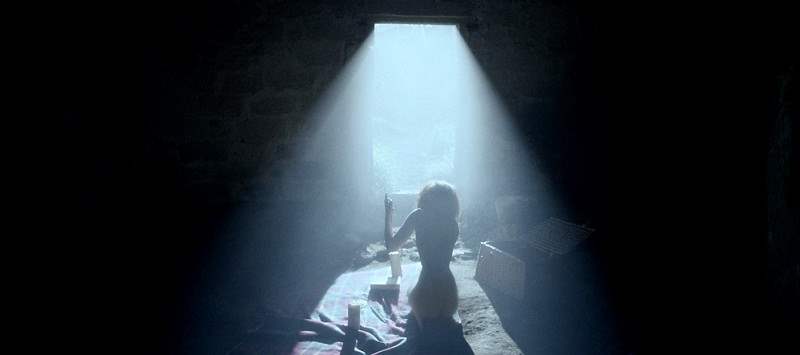 WH: The locations in the movie are absolutely gorgeous. How difficult was it to find those and how difficult was shooting in the middle of that city?
WH: The locations in the movie are absolutely gorgeous. How difficult was it to find those and how difficult was shooting in the middle of that city?
Justin Benson: Yeah, for a while we thought we were gonna have to scrap the script, because everyone told us we absolutely could not shoot in Italy. There was bureaucracy and a slight amount of corruption and the fact that it’s really expensive. Tons and tons of reasons. Every time we’d bring it up to people that have done it, because they already do it, they’d be like, “No, don’t do it. Do not go shoot in Italy.” Then we were at a film festival, we were walking down the street and our film festival host was like, “That’s our Film Commission,” and we were like, “Oh cool! Can we go talk to them?” So we get around and we talk to the Film Commission and we told them what we have. The script had been written for the Amalfi Coast and they pretty much confirmed that yeah, you can’t really go shoot indie films in the Amalfi Coast, but there’s this one region called Apulia that has tax credits and film funds and rebates and all that kinda stuff. So we went and we met with that Film Commission and they took us on a location scout. We found all of the exact locations in the script, even though the script was for the Amalfi coast, those locations looked the same, aesthetically they were roughly the same. And then going to go shoot there, everything everyone told us about Italian crews was incorrect. We didn’t experience any corruption. There was bureaucracy, but it didn’t handicap our production. It was one of the best crews we’ve ever worked with. There was a fireworks display on our last day of shooting. Literally. Over the ocean.
WH: As far as the shooting, I saw in the Behind the Scenes that there is a bit of gopro footage in the film? How tough was it from a technical standpoint to get that to fit the rest of the movie? There is some gopro stuff in The Hobbit, and it sticks out like a sore thumb, but in Spring I couldn’t even tell.
Aaron Moorhead: Ha! Yeah it does, that’s actually really true. I remember watching it and being like, “I don’t know, they mentioned there was some bad gopro footage, but I’m not seeing it,” and then as soon as it came on I’m like, “Oh my God!” On a technical level it was surprisingly pretty easy. As a visual person I was pretty freaked out about it, but never so freaked out that I was like, “Oh this isn’t gonna work.” We wouldn’t do it if it didn’t work. But yeah, we just took every precaution when it comes to shooting your footage in a way that has a similar dynamic range and stuff. You know because it’s gonna intercut with RED. We have a really amazing colorist who was able to match it all really really nicely. There’s a lot of stabilization, a lot of removing kind of the “jello effect” because it is a very small drone. It’s a tiny little toy drone, basically. There’s also removing the shadow of the drone in some shots. We decided on a technical level very few people are actually going to be able to tell a difference. Especially that’s only in the theater, I think on a blu ray or DVD no one’s gonna know, and that’s where the vast majority of people are probably gonna end up watching it. We’ll check our camera snobbishness at the door and see if we can actually make this shot work the best way. So yeah, it wasn’t too hard. Also, our stabilizer is a friend of mine who I hadn’t seen for a long time. He’s one of my oldest friends and I met him at a party again. He’s like, “Oh hey, Spring’s looking really good! (It was before Spring was finished) Let me know if you ever need any footage stabilized.” I’m like, “Oh why?” and he’s like, “Oh well know how David Fincher requires that every shot is super stable and all of that and even requires his dailies to be stabilized?” and I’m like, “Yeah I know,” and he’s like, “Well I’m that guy. I’m the guy that does that.” So I’m like, “Yeah I’ll take you up on that.”
 WH: So I guess my last question is what is next in the pipeline?
WH: So I guess my last question is what is next in the pipeline?
Justin Benson: Yeah, most likely our next movie is a movie that we will shoot in Scotland about Alistair Crowley, the late 1800’s/early 1900’s occultist. Sort of like Resolution is kind of a deconstruction of an old friendship and Spring is exploring the opening beats of a romantic relationship, the relationship we’re exploring with Alistair Crowley is between a man and his ego. Then, we’ve got another movie we have in development called Showdown at the Cataclysm that we’re basically just developing some visuals right now. There’s a first draft of the script that I’m working on a little bit more, and one called Hydra, which I think the best way to describe it is… have you seen Almost Famous or Dazed and Confused?
WH: I’ve seen Dazed and Confused.
Justin Benson: It’s like that kind of authenticity and earnestness about youth culture except in this case when we get to Hydra it’s extremely up to date. So take that feeling, that stuff and combine it with something like Lost or Twin Peaks. That’s probably the best way to describe it without giving you a one hour pitch.
WH: It’s interesting, because the Alistair Crowley one, on a surface level, sounds totally different from Spring, but it’s still going to a foreign location and exploring a very human relationship, so it actually fits really well with the film you just did.
Justin Benson: Yeah, people will definitely see it as a logical progression and a kind of spiritual cousin to Resolution and Spring.
WH: Thank you so much for taking the time to talk to me!

